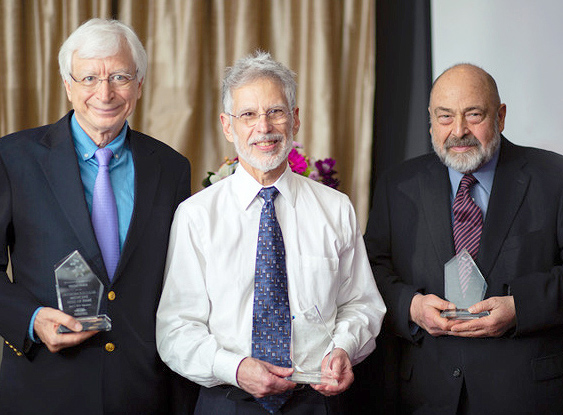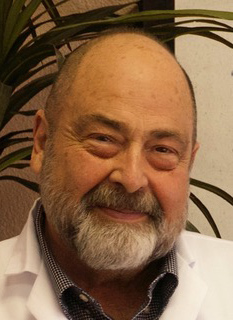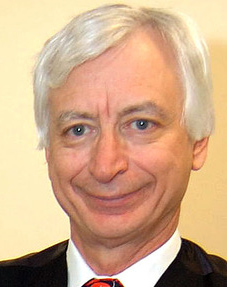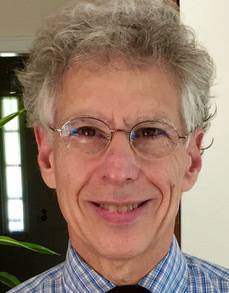The Orthomolecular Medicine Hall of Fame was established in 2004 by the International Society for Orthomolecular Medicine to honour the pioneers and leaders in Orthomolecular Medicine. Today, there are over seventy-five people in the Hall of Fame – physicians, researchers, professors and advocates – each having made a significant contribution to the foundation and growth of Orthomolecular Medicine around the world. These remarkable people make up the rich history and broad range of interest and experience in Orthomolecular Medicine.
Every year, members of the Hall of Fame nominate others whom they consider worthy of inclusion. The submissions are reviewed and voted on by Hall of Fame members; those with the most votes are chosen to be inducted at the following year’s ceremony, which takes place at the Annual Orthomolecular Medicine Today Conference.
.

(L-R: Michael Holick, Mark Levine, Burt Berkson)
 Burton Berkson, MD, PhD, practices integrative medicine at the Integrative Medical Center of New Mexico and is an adjunct professor at Oklahoma State University College of Medicine, former adjunct professor New Mexico State University, and Clinical Assistant professor at Burrell College of Osteopathic Medicine. He has also worked as a researcher and professor at several institutions including the Max Planck Institute, the University of Illinois, and Rutgers University.
Burton Berkson, MD, PhD, practices integrative medicine at the Integrative Medical Center of New Mexico and is an adjunct professor at Oklahoma State University College of Medicine, former adjunct professor New Mexico State University, and Clinical Assistant professor at Burrell College of Osteopathic Medicine. He has also worked as a researcher and professor at several institutions including the Max Planck Institute, the University of Illinois, and Rutgers University.
In addition to his MD training (PhD professor to MD program Autonomous University Mexico and Case Western Reserve Affiliated Hospitals), Dr. Berkson earned a Master of Science degree, and a PhD in the biological sciences from the University of Illinois, Urbana.
For almost thirty years, Dr. Berkson has served as the CDC expert consultant on intravenous alpha lipoic acid and hepatotoxic poisoning and he is a former FDA principal investigator of lipoic acid. He is also the medical mycology expert for the State of New Mexico poison control centers.
As one of the world’s leading experts on alpha lipoic acid, he is an active scientific writer, researcher, and speaker. In 2007 and 2012, Dr. Berkson was invited to lecture at the National Cancer Institute on his lipoic acid/low dose naltrexone therapies that correct mitochondrial dysfunction in various malignant diseases. Berkson has authored and co-authored many scientific papers and has written four books; The Alpha-Lipoic Acid Breakthrough (1998), All About the B Vitamins (1998), Syndrome X (2001, with co-authors) and A User’s Guide to the B Vitamins (2005, with Arthur Berkson).
 Michael Holick, MD, PhD, has made many contributions to the field of the biochemistry, physiology, metabolism, and photobiology of vitamin D for human nutrition. Dr. Holick has established global recommendations advising sunlight exposure as an integral source of vitamin D. He has helped increase awareness in the pediatric and medical communities regarding a vitamin D deficiency pandemic, and its role in causing not only metabolic bone disease and osteoporosis in adults, but increasing risk of children and adults developing common cancers, schizophrenia, infectious diseases including TB and influenza, autoimmune diseases including type 1 diabetes and multiple sclerosis, type 2 diabetes, stroke and heart disease. He published over 550 manuscripts in peer-reviewed journals and more than 200 reviews and book chapters. He has served as editor and/or co-editor on 13 books, and has written The UV Advantage (2004) and The Vitamin D Solution (2010). There have been more than 100,000 citations of his work in the field of calcium, vitamin D and bone metabolism.
Michael Holick, MD, PhD, has made many contributions to the field of the biochemistry, physiology, metabolism, and photobiology of vitamin D for human nutrition. Dr. Holick has established global recommendations advising sunlight exposure as an integral source of vitamin D. He has helped increase awareness in the pediatric and medical communities regarding a vitamin D deficiency pandemic, and its role in causing not only metabolic bone disease and osteoporosis in adults, but increasing risk of children and adults developing common cancers, schizophrenia, infectious diseases including TB and influenza, autoimmune diseases including type 1 diabetes and multiple sclerosis, type 2 diabetes, stroke and heart disease. He published over 550 manuscripts in peer-reviewed journals and more than 200 reviews and book chapters. He has served as editor and/or co-editor on 13 books, and has written The UV Advantage (2004) and The Vitamin D Solution (2010). There have been more than 100,000 citations of his work in the field of calcium, vitamin D and bone metabolism.
As a graduate student he was the first to identify the major circulating form of vitamin D in human blood as 25-hydroxyvitamin D3. He then isolated and identified the active form of vitamin D as 1,25-dihydroxyvitamin D3. He determined the mechanism for how vitamin D is synthesized in the skin, and demonstrated the effects of aging, obesity, latitude, seasonal change, sunscreen use, skin pigmentation, and clothing on this vital cutaneous process.
Dr. Holick has received numerous awards for his research activities including: The Linus Pauling Prize in Human Nutrition, The Linus Pauling Functional Medicine Award, The General Clinical Research Center’s Program Award for Excellence in Clinical Research from the National Institutes of Health, and the Louis Avioli Award from the American Society for Bone and Mineral Research. He was recognized by Thompson Reuters as one of the most influential scientific minds for 2014.
 Mark Levine, MD, is Senior Investigator, Molecular and Clinical Nutrition Section, Digestive Disease Branch of the National Institute of Diabetes and Digestive and Kidney Diseases. A graduate of Harvard Medical School (MD, 1977), he completed his internship and residency at Osler Medical Service, Johns Hopkins Hospital (1977-1980), followed by a NIH Fellowship in Endocrinology and Metabolism, Inter-institute Endocrinology Training Program (1980-1983).
Mark Levine, MD, is Senior Investigator, Molecular and Clinical Nutrition Section, Digestive Disease Branch of the National Institute of Diabetes and Digestive and Kidney Diseases. A graduate of Harvard Medical School (MD, 1977), he completed his internship and residency at Osler Medical Service, Johns Hopkins Hospital (1977-1980), followed by a NIH Fellowship in Endocrinology and Metabolism, Inter-institute Endocrinology Training Program (1980-1983).
Dr. Levine’s laboratory at NIDDK conducts basic, translational, and clinical research which aims to determine optimal nutrition in health, disease, and treatment. His research focuses on vitamin C (ascorbic acid) as a model nutrient, to determine how specific vitamin C functions relate to nutrient concentration in vitro and in vivo.
Dr. Levine’s laboratory seeks a functional basis for nutrient recommendations, rather than relying on preventing deficiency – the previous method used for many years. Many countries base their recommended dietary allowances (RDAs) for vitamin C on his laboratory’s work. Ongoing multiple clinical trials in cancer and sepsis using pharmacologic ascorbic acid are based on their work.
In 2006, Dr. Levine coauthored “Intravenously administered vitamin C as cancer therapy: three cases” (CMAJ 174 (7) 937-942) with Hugh Riordan and John Hoffer, which concluded: “Accumulated data confer some degree of biological and clinical plausibility to the notion that high-dose intravenous vitamin C therapy may have anti-tumour effects in certain cancers.”
Dr. Levine’s research has benefitted the public by providing new ways to: (1) prevent disease and optimize health through nutrition; (2) treat cancer with minimal side effects; (3) slow glucose absorption as an added treatment for obesity and diabetes; (4) prevent or delay complications of diabetes; and (5) improve the collection or storage of red blood cells for transfusion.


